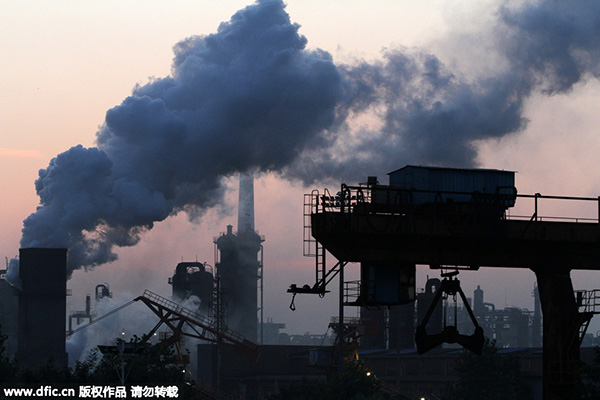Carbon pricing expected to affect firms' investment
Updated: 2015-09-09 09:21
By Zheng Jinran(China Daily)
|
||||||||
 |
|
The large majority of over 300 experts and industry representatives in China who were surveyed believe that carbon pricing will affect the investment of companies with large carbon emissions, pushing them toward green technologies by 2020. [Photo/IC] |
The China Carbon Pricing Survey, released on Tuesday, found that 82 percent of the 304 stakeholders, including large State-owned companies, expect carbon pricing to strongly or moderately affect investment decisions by 2020.
Only 36 percent believe carbon pricing could affect investment next year.
It showed that respondents are confident about the impact of carbon pricing to push forward green technologies in industries, said Dimitri de Boer, head of the China Carbon Forum, which helped carry out the survey from May to July.
The survey demonstrated the expectations on carbon trading in China, he said.
Since 2011, China has designated seven emission trading schemes in places such as Beijing, Shanghai and Shenzhen, Guangdong province, in a bid to gradually set up a nationwide carbon trading market, an efficient market method for the country's larger strategy to promote green, low-carbon development.
More than 1,900 companies with carbon emissions have been listed in the seven pilot schemes. Up to July 26, some 25 million metric tons of carbon dioxide equivalent were traded under these plans, with a value of 830 million yuan ($130 million), according to Economic Daily.
China will expand the pilot schemes across the country by 2017, improving their function and stability by 2020, according to the National Development and Reform Commission.
The carbon pricing survey found that 68 percent of the companies in the pilot schemes have a strategy for emission trading, like improving their technology and facilities, suggesting that the pilot projects are having a significant impact.
Baosteel Group in Shanghai, one of the world's largest iron and steel companies, reduced carbon emissions in 2014 by 4.12 percent from the year before because of the emission trading pilot scheme, Economic Daily said.
But some professionals and companies in the survey were concerned about an undervalued carbon price. Around the time of the survey, carbon prices ranged from 9.5 yuan per ton in Shanghai to 42 yuan per ton in Beijing.
Respondents expect that prices will quickly rebound by the end of 2015 to reach 30 to 50 yuan per ton, affected mainly by government policies, said de Boer.
By 2025, the price will go up to 70 yuan per ton in the nationwide carbon trading market, the survey said.
In addition, 63 percent of the respondents indicated that they are not adequately prepared for the national carbon trading schemes, which means before expanding, governments need to do more training for the companies, he said.

 Russia through the lens
Russia through the lens
 10 things you may not know about White Dew
10 things you may not know about White Dew
 Pet dog turns out to be fox
Pet dog turns out to be fox
 Top 10 most profitable listed Chinese carmakers in H1
Top 10 most profitable listed Chinese carmakers in H1
 Lights, camera, action at Beijing Film Academy
Lights, camera, action at Beijing Film Academy
 Aerial view of Yamzho Yumco Lake in Tibet
Aerial view of Yamzho Yumco Lake in Tibet
 Chinese 'blade runners' fight for sports dreams
Chinese 'blade runners' fight for sports dreams
 The world in photos: Aug 31 - Sept 6
The world in photos: Aug 31 - Sept 6
Most Viewed
Editor's Picks

|

|

|

|

|

|
Today's Top News
Xi's visit a chance for Obama to make history
Unlike Europe, US slow to open its doors to welcome refugees
China celebrates 50th anniversary of Tibet's autonomy
China vows deepened war against Tibet separatists
Sarah Palin: Immigrants should 'speak American'
Germany frees up funds for refugees, speeds up asylum procedures
China 2014 GDP growth revised down to 7.3%
White paper on Tibet reaffirms living Buddha policy
US Weekly

|

|







